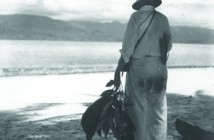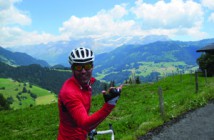TEENAGERS’ BOOK DOCUMENTS LIFE WITH DOWN SYNDROME
Honor societies, student council, junior class president-elect, cross country, track and field, tennis, Key Club, are usual things on a high school teenager’s list, along with parties and hanging out with friends on the weekends. But published author is rarely heard of for high school sophomores. All of these activities are currently on the list of two very talented young ladies.
Gabriella Llano, 15, and Tiziana Vazquez,16, both sophomores at Our Lady of Lourdes Academy in South Miami, have published a young adult novel, In My World: Down Syndrome, which was inspired by Llano’s 10-year old sister, Daniella, who was diagnosed with Down Syndrome. Vazquez and Llano are cousins who are as close as sisters and often even finish each other’s sentences.
In My World is about a young girl with Down Syndrome and how she sees the world, but it also speaks from her mother’s and brother’s points of view and how the entire process affects each of them. The book is targeted for nine through 12-year olds.
“We decided that’s when kids really start to lose their innocence. They do their own thing, have personal experiences and find their group of friends,” said Llano. Vazquez feels it’s a key transition age when kids become more independent. “Before that they don’t really see the flaws in anyone, but when they get to that age, they only see the flaws,” said Vazquez. “You don’t notice if someone has Down Syndrome when you’re three; you just play with them because it’s fun, but then you get to 10 and you notice it completely, but that shouldn’t vary how you view them,” she said.
Llano and Vazquez say there wasn’t a single idea that inspired them to write a book. They started the process about a year ago, but their initial drafts are nothing like the final product.
“We’ve always been involved with my sister and the Down Syndrome Association of Miami. At one of the annual walks, I guess we got inspired and were like, ‘Oh, let’s write a book’,” said Llano.
They shared their idea with their moms and contacted their former English teacher, Mrs. Febo, from St. Theresa Catholic School, to be their editor and help them with the process. They met three times a week to discuss their drafts and ideas. The work was easily split up. Llano wrote in the point of view of the mom, Ava, because she has the mom with a child with Down Syndrome and could understand her better. Vazquez wrote in the point of view of the 16-year old brother, Javi, because she plays sports like the character and would draw on how he would think and act from her experiences with her older brother. They both wrote the main character, Mika, together.
“Gaby would ask me questions about Ava. She took great effort to try and understand what it feels like to have a daughter with Down Syndrome. She tried to put my emotions into words,” said Ayleen Pinera-Llano, Gabriella’s mom. “I think we grew closer during this process, and she got a better understanding of our family.”
The girls missed events and nights out with friends in exchange for their laptops, while keeping their book writing a secret from their teachers and friends.
“It’s not easy. During the summer, when we really wrote hard core, we missed out a lot like going to the beach, going out, sleeping in,” said Llano. “It was worth it. We knew it was going to make more of a difference.”
Many times while at get-togethers with friends they would want to talk about it but knew they couldn’t say anything. Each would tell the other not to forget to come over for a family get-together, code
that there was an idea they had to get writing.
“We are teenagers. We didn’t share it just in case we didn’t find a publishing company or we didn’t go through with the publishing process, because it was more grueling than the writing process,” said Vazquez. “It takes a while, and our family was extremely supportive.”
“I was very impressed with Tiziana’s dedication to a project that would take her away an entire summer from the beach, her friends and parties. As they met at my house, it was wonderful to witness their creative process in action,” said Silvia Pinera-Vazquez, Tiziana’s mom. “Having never written a book, the girls faced many writing and creative challenges but never wavered from their commitment to complete the book.”
They don’t plan on this being a one-time thing. They are now brainstorming for their next book, which they hope to be on autism and are planning the third on a physical disability like blindness or deafness.
What’s next for these two? Llano will be attending a medical school summer program for a week in Georgetown. She has dreams of following in her mother’s footsteps and becoming a doctor, though she doesn’t want to give up her creative side and passion for writing and art. Llano, who also designed the cover of the novel, aspires to work with kids and medicine in some capacity. Vazquez, who once also had dreams of becoming a lawyer like her mother, now aspires to go into film or screenwriting after going through this writing process. She will be honing her skills during a week-long film program at UCLA this summer. These aren’t your average teenagers who are wasting hours away on their iPhones or Facebook.
The girls are donating all proceeds of the book to the Down Syndrome Association. They are hoping to raise enough funds for a dolphin therapy program for children. After Dani attended a similar program on scholarship in the Keys, Llano wanted to give other kids that opportunity.
“I saw how all the kids there benefited from that program, so I loved it. I’ve been wanting to bring it to Miami, but there hasn’t been any funds for it,” said Llano.
“The love and care these committed young women have expressed in both written word and action filled the hearts of the community of Our Lady of Lourdes Academy with great pride. We are grateful for their determination, success and influence in our society,” said Sister Kathryn Donze, Principal at Our Lady of Lourdes Academy.
Their main message for the book is empathy.
“We put our brains into a girl with Down Syndrome, and we have no idea how Dani feels or what she thinks,” said Vazquez. “The same goes for us in the real world. If you see someone struggling or feeling bad, you don’t know how they feel, you don’t know what they’ve gone through so don’t judge them right away.”



